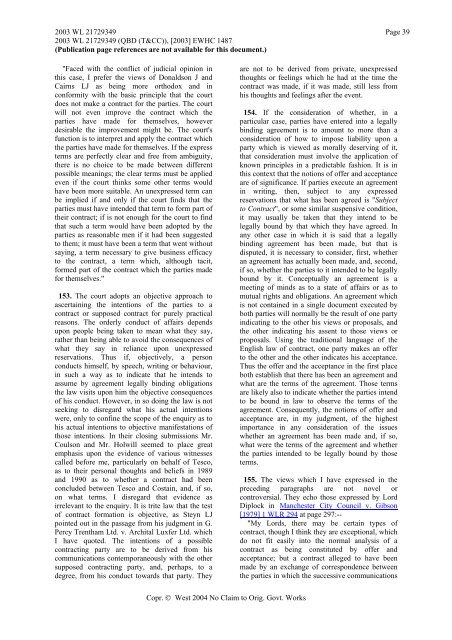Tesco v Constain - Thomson Reuters
Tesco v Constain - Thomson Reuters
Tesco v Constain - Thomson Reuters
You also want an ePaper? Increase the reach of your titles
YUMPU automatically turns print PDFs into web optimized ePapers that Google loves.
2003 WL 21729349 Page 392003 WL 21729349 (QBD (T&CC)), [2003] EWHC 1487(Publication page references are not available for this document.)"Faced with the conflict of judicial opinion inthis case, I prefer the views of Donaldson J andCairns LJ as being more orthodox and inconformity with the basic principle that the courtdoes not make a contract for the parties. The courtwill not even improve the contract which theparties have made for themselves, howeverdesirable the improvement might be. The court'sfunction is to interpret and apply the contract whichthe parties have made for themselves. If the expressterms are perfectly clear and free from ambiguity,there is no choice to be made between differentpossible meanings; the clear terms must be appliedeven if the court thinks some other terms wouldhave been more suitable. An unexpressed term canbe implied if and only if the court finds that theparties must have intended that term to form part oftheir contract; if is not enough for the court to findthat such a term would have been adopted by theparties as reasonable men if it had been suggestedto them; it must have been a term that went withoutsaying, a term necessary to give business efficacyto the contract, a term which, although tacit,formed part of the contract which the parties madefor themselves."153. The court adopts an objective approach toascertaining the intentions of the parties to acontract or supposed contract for purely practicalreasons. The orderly conduct of affairs dependsupon people being taken to mean what they say,rather than being able to avoid the consequences ofwhat they say in reliance upon unexpressedreservations. Thus if, objectively, a personconducts himself, by speech, writing or behaviour,in such a way as to indicate that he intends toassume by agreement legally binding obligationsthe law visits upon him the objective consequencesof his conduct. However, in so doing the law is notseeking to disregard what his actual intentionswere, only to confine the scope of the enquiry as tohis actual intentions to objective manifestations ofthose intentions. In their closing submissions Mr.Coulson and Mr. Holwill seemed to place greatemphasis upon the evidence of various witnessescalled before me, particularly on behalf of <strong>Tesco</strong>,as to their personal thoughts and beliefs in 1989and 1990 as to whether a contract had beenconcluded between <strong>Tesco</strong> and Costain, and, if so,on what terms. I disregard that evidence asirrelevant to the enquiry. It is trite law that the testof contract formation is objective, as Steyn LJpointed out in the passage from his judgment in G.Percy Trentham Ltd. v. Archital Luxfer Ltd. whichI have quoted. The intentions of a possiblecontracting party are to be derived from hiscommunications contemporaneously with the othersupposed contracting party, and, perhaps, to adegree, from his conduct towards that party. Theyare not to be derived from private, unexpressedthoughts or feelings which he had at the time thecontract was made, if it was made, still less fromhis thoughts and feelings after the event.154. If the consideration of whether, in aparticular case, parties have entered into a legallybinding agreement is to amount to more than aconsideration of how to impose liability upon aparty which is viewed as morally deserving of it,that consideration must involve the application ofknown principles in a predictable fashion. It is inthis context that the notions of offer and acceptanceare of significance. If parties execute an agreementin writing, then, subject to any expressedreservations that what has been agreed is "Subjectto Contract", or some similar suspensive condition,it may usually be taken that they intend to belegally bound by that which they have agreed. Inany other case in which it is said that a legallybinding agreement has been made, but that isdisputed, it is necessary to consider, first, whetheran agreement has actually been made, and, second,if so, whether the parties to it intended to be legallybound by it. Conceptually an agreement is ameeting of minds as to a state of affairs or as tomutual rights and obligations. An agreement whichis not contained in a single document executed byboth parties will normally be the result of one partyindicating to the other his views or proposals, andthe other indicating his assent to those views orproposals. Using the traditional language of theEnglish law of contract, one party makes an offerto the other and the other indicates his acceptance.Thus the offer and the acceptance in the first placeboth establish that there has been an agreement andwhat are the terms of the agreement. Those termsare likely also to indicate whether the parties intendto be bound in law to observe the terms of theagreement. Consequently, the notions of offer andacceptance are, in my judgment, of the highestimportance in any consideration of the issueswhether an agreement has been made and, if so,what were the terms of the agreement and whetherthe parties intended to be legally bound by thoseterms.155. The views which I have expressed in thepreceding paragraphs are not novel orcontroversial. They echo those expressed by LordDiplock in HManchester City Council v. Gibson[1979] 1 WLR 294 at page 297:--"My Lords, there may be certain types ofcontract, though I think they are exceptional, whichdo not fit easily into the normal analysis of acontract as being constituted by offer andacceptance; but a contract alleged to have beenmade by an exchange of correspondence betweenthe parties in which the successive communicationsCopr. © West 2004 No Claim to Orig. Govt. Works
















